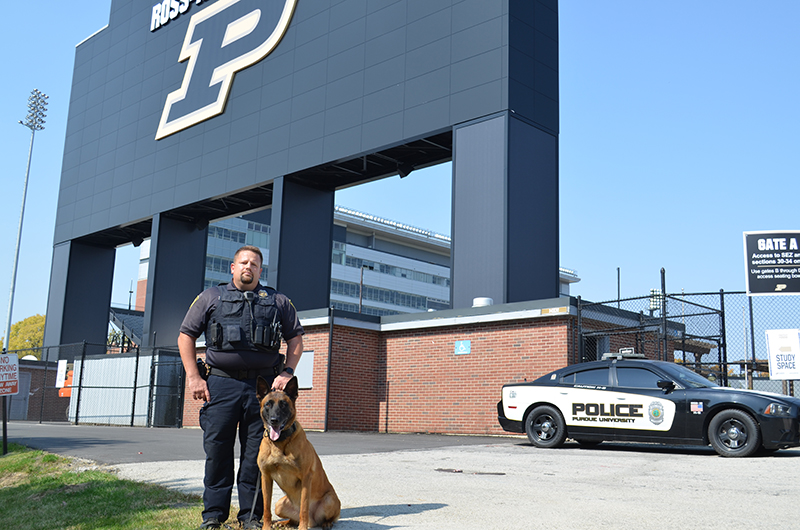October 13, 2021
Purdue police using K-9s, bicycles to enhance safety services
 Officer Gabe Argerbright and K-9 Aiko are one of four handlers and K-9s with the Purdue University Police Department. Argerbright became a K-9 handler in 2010. (Photo provided by Administrative Operations)
Officer Gabe Argerbright and K-9 Aiko are one of four handlers and K-9s with the Purdue University Police Department. Argerbright became a K-9 handler in 2010. (Photo provided by Administrative Operations)
Working with animals has always been a passion for Purdue University K-9 Officer Gabe Argerbright.
“I grew up on a farm and my family was heavily involved with 4-H, so working with animals was a big part of my upbringing,” Argerbright says. When the opportunity to become a K-9 handler in the Purdue University Police Department (PUPD) arose, he knew it was something he wanted to do.
“At the time, I wasn’t too familiar with the world of K-9 handlers, but I knew I was good at training and taking care of animals,” he says.
Fast forward 11 years. Argerbright and K-9 Aiko are one of four K-9 teams within PUPD. Two dogs, one being Aiko, are certified in explosive materials detection, and the other two are certified narcotics detection dogs. They are considered dual-purpose dogs, meaning they are trained in scent detection and in suspect apprehension. The K-9 program plays a vital role in the department’s overall strategy to provide a safe campus environment.
“We work all across campus, making sure our facilities and buildings are secure,” Argerbright says. “Our goal is to make sure everyone who is on campus or visits campus for a game or special event has the safest, most enjoyable experience possible.”
While the handlers and K-9s typically spend the majority of their shifts on foot, a different group of officers can be seen on bicycles. A number of officers within PUPD are certified with the International Police Mountain Bike Association (IPMBA) as bicycle officers. These officers are assigned to patrol and ride bikes in addition to their normal patrol duties.
On Aug. 1, PUPD assigned two officers to full-time bike patrol. Officers Geoffrey Carlson and Wilcher Smith spend their workweek patrolling intersections and routes shared by pedestrians, bicyclists, those operating EMPVs (electric and motor powered vehicles) and motorists.
“These officers interact more closely with the campus community,” PUPD Chief John Cox says. “This has been especially important this academic year with campus operations returning to normal and our record enrollment. There has also been somewhat of an adjustment with new bike lanes along Martin Jischke Drive, the Chill Zone on Third Street and several new multi-use asphalt paths.”
In 2020, PUPD officers trained nearly 2,600 hours to remain certified and current with best policing practices as they respond to the various demands of a large university. That number was down from nearly 3,000 hours in 2019 and nearly 3,800 hours in 2018 due to the COVID-19 pandemic.
Officers assigned to extra duties, including the K-9 teams or bike patrol officers, go above and beyond with training. K-9 handlers and their dogs spend 240 hours to get their initial certification and an additional 16 hours a month working with their dogs to keep them certified and ready. This includes participating in the annual K-9 Olympics at Vohne Liche Kennels, a training facility for police dogs. Bike officers receive 40 hours to get the initial certification in addition to their normal required training.
“It is absolutely critical that our officers have the proper knowledge and skills to address a wide range of emergencies and situations that can occur at an institution as large as Purdue,” Cox says. “From assisting with pedestrian and bicycle safety to investigating a suspicious packages or bomb threat, all of our officers have to be prepared for whatever their day may bring.”
Ongoing training is one of the reasons the department has been reaccredited by the Commission for Accreditation of Law Enforcement Agencies (CALEA) for a fourth time in a row. The CALEA accreditation program requires PUPD to comply with written standards that provide best practices related to police procedures. Nearly 200 written general orders guide the department and each officer every day.
“This ongoing reaccreditation is a testament to the hard work and dedication of our officers,” Cox says. “This international endorsement helps provide reassurance for students, faculty, staff, parents and visitors that their police department is putting forth our best efforts to keep them safe.”
The department recently announced all officers will soon be equipped with body-worn surveillance cameras. Cox says the body worn camera (BWC) program will add a valuable, reliable resource for collecting evidence during investigations and provide another level of transparency for the public. Additional CALEA approved general orders will be implemented with the use of the body-worn camera system.
Officers also offer personal protection training and educational programs to the Purdue community. Some of these include monthly Verbal De-escalation training, Self-Defense Awareness and Familiarization Exchange (SAFE) and K-9 demonstrations.
“Everyone loves the dogs. Our K-9 officers and their dogs are specially selected to work in a university environment. The Purdue and surrounding community loves interacting with them and seeing them in action at major events,” Argerbright says. “It’s also rewarding for us, going into the local schools and showing off all our hard work and training.”
More information about the personal protection training and educational programs, including how to request a K-9 demonstration, can be found on the Purdue University Police Department website. To learn more about the Purdue University Fire Department, be sure read the Purdue Today story on how it works to keep campus safe and healthy.

